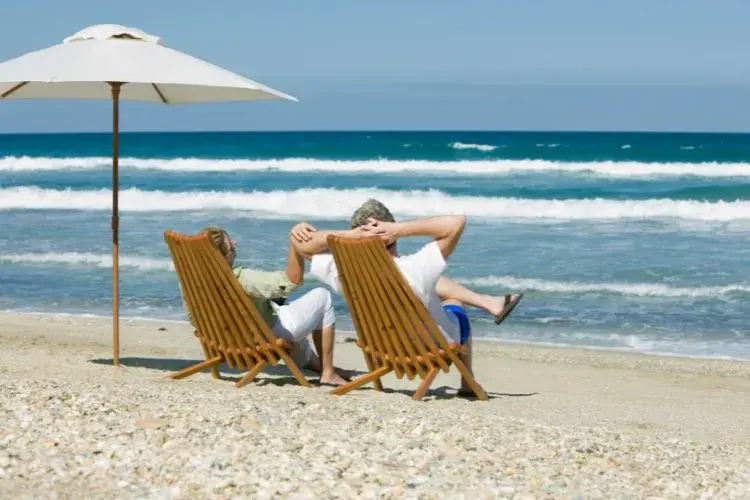25 de June, 2023

Portugal is currently one of the most popular retirement destinations in the world. If you also have the desire to enjoy your retirement relaxing in Europe, then you need to know about the D7 Portugal Visa, also known as the retirement visa. It is intended for people who have their own passive income, such as pensions, rents and investments. With it it is possible to live legally in the country, travel freely in the Schengen area, use the Portuguese public health system, have access to tax benefits (non-habitual resident status) and even apply for Portuguese citizenship after 5 years living in Portugal. This article provides information on the details of the D7 Visa, including who it is meant for, the requirements, advantages, and the application process. Discover the benefits of this visa and learn how to apply.
The D7 Visa Portugal is a type of residence visa available in Portugal. It is intended for people who wish to reside in the country based on their own income, such as pensions, retirements, property rents, company profits and dividends. It is a popular option for retirees and people who have stable passive income.
Realizing your goal of living in Europe or obtaining European citizenship can be simpler than you think. We offer personalized support to make the immigration process more accessible and uncomplicated.
Meet the Non-Lucrative Visa: Spain’s D7 Visa
The Portugal D7 Visa is intended for holders of passive income, that is, from an investment that generates returns over time, without the need for continuous and direct intervention by the person. These sources include:
Which one is better for you: Portugal D7 Visa or Spain Non-Lucrative Visa?
These are examples of passive income:
And what is the Golden Visa Portugal? Check it out here!
In the case of a single individual, it is necessary to prove a monthly income of at least 820€ for a minimum period of one year. This amount is equivalent to the Portuguese minimum wage in 2024. The applicant must also demonstrate the ability to support him/herself in the country for a period of one year by depositing 12 times the minimum wage in a Portuguese bank account (which equals EUR 9,840 for the main applicant).
It should be noted that the minimum income required varies according to the number of people in the applicant’s household. The calculation of the per capita income in the household is done as follows:
The visa approval depends on the analysis (by the Portuguese government) of the applicant’s profile, as well as his/her passive income (values, sources, etc). In practice, higher and more stable incomes have more chances of approval.

This is the most important part of the process, and the one that raises many questions. For those who are retired, it is necessary to attach to the application the proof of retirement and the Income Tax Statement. For those who live off income, it is necessary to present financial proof of this income and a tax return.
For example, if your income is from renting real estate, that rent needs to be declared in your income tax.
The proof of income is not only necessary when applying for the visa, but also to remain regular in the country and ensure the renewal of the residence permit. Therefore, in addition to proving the necessary income to apply for the retired person’s visa in Portugal, it will be necessary to present proof every 2 years that you still have the financial capacity to support yourself in the country in order to renew your residence permit.
Apply For You D7 Visa! Talk to an specialist>
In 2022 , the Portuguese government created a visa exclusively for digital nomads. Since then, the D7 Visa is no longer accepted for remote workers. The Digital Nomad Visa is already in operation with great demand, especially from the British, Americans and Brazilians.
For the D7, there is no need to make an investment in the country prior to the visa application in order to become eligible, although you can do so if you wish.
In addition, the process of obtaining the D7 passive income visa is considerably faster and
less costly than the Golden Visa, and also entitles you to the main benefits of residency in Portugal.
DO YOU WANT TO LIVE AS A PENSIONER IN PORTUGAL? CLICK HERE TO CONTACT US >
To keep your renewable residence permit, you must remain in Portugal. You cannot be absent from the country for more than 6 consecutive months or 8 months interpolated, within the total period of validity of the temporary residence permit (RA), and the first RA lasts for two years.
Failure to meet this requirement may lead to non-renewal of the residence permit. For those who do not intend to or cannot spend the minimum period required by law in Portugal, we recommend the Portuguese Golden Visa, which has a requirement to stay only 14 days during the validity of the Residence Permit (which is 2 years).
No. However, you must provide proof of accommodation in Portugal. This can be, for example, a rental contract.
Get to know Uniplaces, uncomplicated renting in Portugal.
D7 Visa applicants must possess valid travel insurance. This insurance must be able to cover necessary medical expenses, such as urgent medical assistance and repatriation in case of death.
However, for Brazilians who are applying for a visa in Brazil, it is possible to replace the travel insurance with a document called PB4. This document is issued by the Brazilian Ministry of Health and meets the required requirements.
One of the documents required to obtain a residence permit through the D7 Visa is proof of accommodation. There are three options:
In practice, the acceptance of each of the documents has varied greatly depending on the nationality and/or place of residence of the applicant. Applicants from the USA and UK have had greater flexibility from the authorities. In Brazil, for example, the invitation letter is no longer a possibility.
Public deeds are the documents with the highest degree of approval by Consulates, followed by lease agreements.
Currently, the respective Residence Permit is initially valid for 2 years. After that, it can be renewed once for a period of 3 years. After this period, the renewal happens every 5 years, and after 5 years of legal residence it is possible to apply for Portuguese nationality, by naturalization.
Apply For Your D7 Visa! Talk to an expert!
Yes, in Portugal the D7 Visa allows the holder to work and study in the country, as well as reunited family members.
Newcomers residing in Portugal have the opportunity to take advantage of the Non Habitual Resident Status (NHR) and thus enjoy tax benefits in relation to various taxes in the country. The non-habitual resident status can be maintained for a period of 10 years. Check here the current rules.
Due to this special status, pensions and retirements from foreign sources are taxed at 10% on their net value, which is still advantageous compared to the general tax conditions in the country for non-HNR people.
Finally, it is important to remember that those who become legal residents in Portugal also become, as a rule, tax residents in the country. Therefore, it is essential that new residents properly inform themselves about their tax obligations in the country, including income tax returns, in order to avoid unpleasant surprises, such as notifications or assessments by the Portuguese Tax Authority. Read here an article about the importance of tax security in global moving.

Author:
Silvia Resende